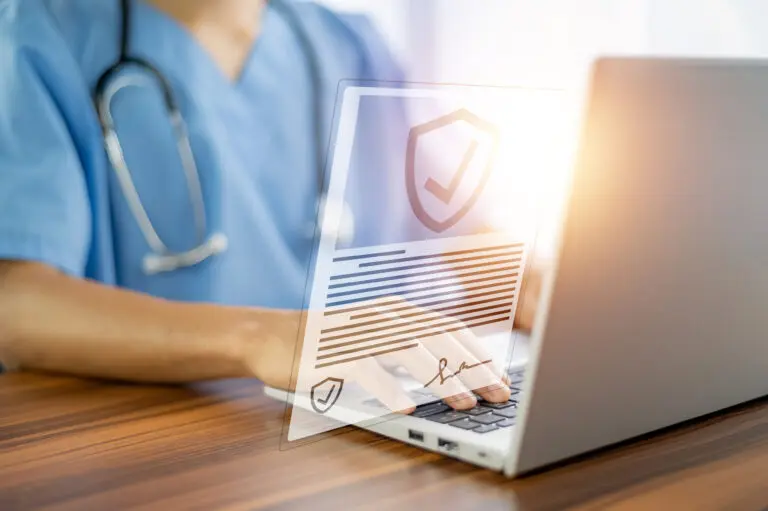As organizations navigate the increasingly complex and dynamic landscape of cybersecurity threats, the need for strategic leadership in information security has become more pronounced. But, did you know a virtual Chief Information Security Officer (vCISO) can play a pivotal role in enhancing the capabilities and effectiveness of your existing security team? We detail seven ways a vCISO can support and contribute to the specific needs of your organization.
1. Strategic Planning & Roadmap Development
A vCISO brings a wealth of experience and expertise to the table, enabling them to contribute to the development of a comprehensive and tailored security strategy. By understanding an organization’s business goals and risk appetite, the vCISO can help create a roadmap that aligns security initiatives with broader corporate objectives. This strategic alignment ensures that security efforts are robust and in harmony with the organization’s overarching mission.
2. Risk Management & Compliance
Additionally, a vCISO can assist the existing CISO and security team in identifying, assessing, and mitigating risks. vCISOs are well-versed in compliance requirements, security governance, and can also ensure that an organization adheres to relevant regulations and standards.
Although you may already have a certain Information Security Management System (ISMS) in place, as your organization matures and cloud landscapes change, it is vital to increase control sets for each framework. This is an area where a vCISO can not only advise you on what controls are necessary or pertinent for the business’s expansion, but they can also help you intricately understand how to implement each control in a particular environment.
Therefore, by implementing a risk management framework or bolstering an existing program, the vCISO can guide your team in prioritizing security measures based on potential impact and likelihood, optimizing resource allocation.
3. Incident Response & Crisis Management
In the event of a security incident, a vCISO can provide valuable insights and expertise in formulating and executing an effective incident response plan. Their experience allows them to navigate crisis situations with a calm and methodical approach, ensuring that the security team responds promptly and effectively to minimize damage and downtime.
4. Security Awareness & Training
Education is a cornerstone of effective cybersecurity, and a vCISO can collaborate with the existing team to develop and implement a strong security awareness program for employees. This program can include training sessions, simulated phishing exercises, and regular updates on emerging threats. By enhancing the cybersecurity knowledge of staff, the organization becomes better equipped to prevent and respond to security incidents.
However, every organization has different areas of vulnerability. Therefore, phishing and/or social engineering engagements need to be targeted in areas that are the weakest links. In this case, vCISOs may be able to help find and analyze data on the areas that should be targeted in these engagements. By conducting a third-party analysis of your organization, they can provide a non-biased perspective on areas that need strengthening. Nevertheless, if your staff can identify a potential threat early on, this can help the security team respond to incidents faster, limiting the potential exposure of an incident.
5. Technology Evaluation & Implementation
Staying well-informed of the latest security technologies is a daunting task for any security team, however, a vCISO can assist in evaluating and selecting the most suitable technologies based on the organization’s needs and budget. They can also provide guidance on the implementation of these technologies, ensuring seamless integration with existing systems and processes. These systems and vendors may include Security Information and Event Management (SIEM) providers, managed services, accreditation bodies, and compliance tools.
6. Continuous Improvement & Benchmarking
A vCISO can facilitate regular security assessments and benchmarking exercises to measure the effectiveness of security measures. By analyzing metrics and key performance indicators, the vCISO helps the existing team identify areas for improvement and implement continuous enhancement initiatives.
7. Board & Executive Communication
Communication with the board and executive leadership is critical in advocating for security investments and garnering support for cybersecurity initiatives. A vCISO can serve as a liaison, translating technical details into business-oriented language and make a compelling case for security measures that align with the organization’s overall objectives.
Conclusion
In conclusion, a virtual Chief Information Security Officer can serve as a force multiplier for an existing security team. Their strategic guidance, risk management expertise, and ability to bridge technical and business perspectives contribute significantly to an organization’s overall cybersecurity posture. With a vCISO in place, an organization can navigate the evolving threat landscape with confidence and resilience.
Are you interested in utilizing a vCISO service to assist your security team? Please reach out to a member of our team today!



